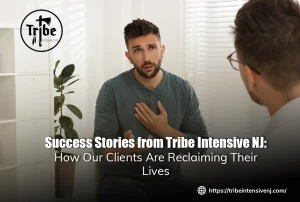We’ll forgo the suspense and answer the question “can you go to rehab without dropping out of college,” right off the bat. The answer is absolutely yes, you can.
If you’re grappling with addiction, you don’t have to wait until things fall apart to get help. In fact, if you’re proactive about your sobriety your outcomes are almost sure to be better and your academic path can remain intact.
Addiction treatment in college is increasingly supported by both universities and external providers. Many colleges like Rutgers, NJIT, and Princeton may even offer amenities like sober housing and peer support. These are amazing support resources, but how can you get started, and what does the process look like?
You must remember: addiction is not a personal weakness, it is a disease. It is as shameful as diabetes. Getting help is the real strength. Here’s how.
Rehab for College Students
If you think you may need help with substance abuse, here’s what you should do and what treatment will likely look like.
First you have to pick up the phone. You can speak with authorities at your university who may or may not have the resources to offer immediate and decisive help, or you can call a treatment center like ours who can arrange everything and get you into treatment rapidly.
The first step in drug treatment will likely be a medically supervised detoxification. This means overcoming the physical facets of drugs or alcohol while under the care of medical professionals. “Withdrawal” is likely a term you’ve heard before, and this process helps you get over the worst of it in the safest and most comfortable manner possible.
In some cases, with alcohol and benzos specifically, the process of detoxification can be deadly if unsupervised and must be done under the care of professionals. The good news is, it rarely takes longer than a week so you won’t miss too many classes or activities and we can give you a doctor’s note. Universities are sure to be accommodating.
Next, you will participate in outpatient treatment. Depending on the program you and your doctor decide is the best fit, you may attend treatment a couple of hours a day a couple of days each week, to six times a week for multiple hours.
During this time you can live at home or in a sober living house, work, and importantly, still go to school. Many programs can work around your schedule.
How to Get Addiction Help While in School
The biggest step is asking for help.
Many people who have an addiction have difficulty recognizing they have a problem. If you have recognized one in yourself or someone you love, this is the first step. The next step, and often the hardest, is asking for help.
Addiction, unfortunately, can carry a stigma. We want to be plain in saying this is wrong and incorrect. Addiction is a disease, a disease that can come for anyone. It’s like attaching a stigma to cancer.
We also want to be clear: we’re here to help you, not to turn you into the police. By admitting you have a problem and seeking help, we’re not going to turn you in to the authorities. We’re not the cops. You have nothing to fear by contacting us.
If you are worried about campus administrators or speaking with your parents, we can also help you on this front as well. Campus administrators are sure to be understanding, and health professionals are bound by strict laws that mandate they can’t disclose your disease.
But you need to ask for help. Mental health and substance abuse help for college students is out there, but you need to reach out your hand and grab it.
To Parents or Friends: How to Support a College Student Needing Rehab
To those dealing with the often heartbreaking effects of a drug or alcohol addiction in their loved ones, we want to remind you help begins with love, not anger. It’s particularly important to let your child or student know that you believe in their potential and their dreams. Remember, addiction is a disease. It can come for anyone.
Addiction does not mean someone is weak. It means they’re dealing with something bigger than themselves, just as if they had cancer or heart problems. Like with any disease, one of the best ways you can help is to invite them to consider professional support. Emphasize that this isn’t just quitting, it’s rediscovering a healthier, more sustainable path through college. They’ll thank you for it in the end.
You can assure your loved ones they can take classes part-time during treatment and build toward returning full-time. You can also help them contact campus services or explore leave-of-absence policies that preserve their scholarships and housing.
In addition, you can contact a treatment facility like ours ahead of any conversation you may have with them about their drinking or drug use. Once someone is amenable to going to treatment it’s best to have them enter immediately, before they change their mind or relapse. Already having a conversation with a treatment center so the process of safe detoxification can start is the best move.
Most of all, love them. They need your help and support.
What Tribe Intensive Offers
Tribe Intensive provides an easy and seamless continuum of care from medical detox to outpatient recovery, all designed for students. The detox phase, if needed, typically lasts a few days to a week and is overseen by medical professionals ensuring safety and comfort.
After detox, students transition into an outpatient treatment plan where therapy, relapse prevention, stress management, and reintegration support happen in a structured environment that’s still flexible enough for school demands.
We can set everything up with a phone call, and make it exceptionally easy for you or your loved ones to receive the help they need as quickly as possible without having to traverse the often Byzantine or incomplete mental health systems elsewhere.
Get Fast, Easy, Confidential Help Today: Call Now
Yes, you can go to rehab while attending college. Many students do, and you’re not alone. You don’t have to sacrifice your education to be healthy, and in fact, getting healthy will vastly improve your education. You don’t have to feel trapped.
If you’re ready to take the next step, give us a call at (856) 267-5699. We can talk you through everything you need to know and get you help quickly and easily. We’re also more than happy to talk with the families of those experiencing addiction to discuss options for your loved ones.
You don’t have to choose between addiction and school, and you don’t have to wait. Pick up the phone and call now. We’re looking forward to helping you into your new life.
Sources:
Supporting Students in Recovery on College Campuses: Opportunities for Student Affairs Professionals. National Library of Medicine.
Preventing and Reducing Youth and Young Adult Substance Misuse: Schools, Students, Families. U.S. Department of Education.


